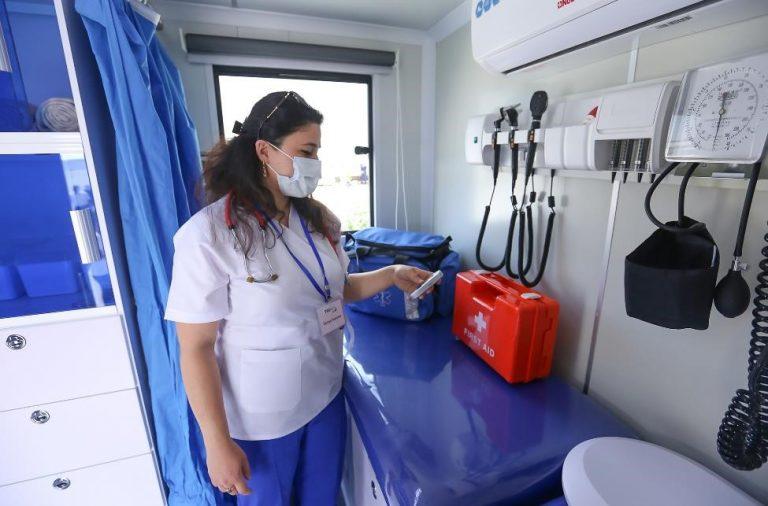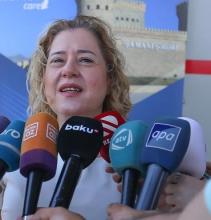
"We have a wonderful chance to strengthen primary health care in Azerbaijan to address the needs of most people. We hope that very soon, we will be able to demonstrate a useful, practical and cost-effective model for this country in collaboration with our national counterparts.”
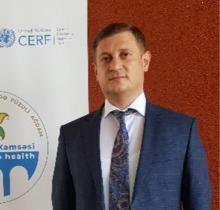
"Primary health care workers play a significant role in combating the COVID-19 pandemic. The main goal of the WHO's PROACT-Care project in Shamakhi is to strengthen primary health care [...] It will be expedient to apply the primary health care model developed in Shamakhi throughout the country.”
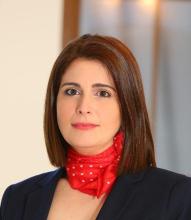
"Perfectly functioning primary health care services have the potential to prevent diseases, improve patient care and save lives while making health care accessible for all. Even in the most remote villages of our country, people should have access to primary health care, and economic growth as well as health care transformation will allow us to achieve our goals. This project is important for the creation of a sustainable primary health care model in Azerbaijan using existing health and human resources more efficiently.”
A pilot project in Shamakhi region in Azerbaijan is enabling remote communities to access primary health care services, including COVID-19 vaccinations.
Many communities have been unable to access health services in remote and rural areas due to an inadequate primary health care services. Lessons learned from this pilot project will be scaled up and applied nationwide.
All people in Azerbaijan will be able to access the preventive, diagnostic and therapeutic health services they need as part of the country’s commitment to universal health coverage.
In Shamakhi region, WHO has trained and supported a range of health workers including paediatricians, family doctors and mobile clinic drivers, to provide essential primary health care services to remote populations.
THE LONG READ
The Shamaki district, a mountainous area in the east of Azerbaijan, is home to about 106,000 people, most of whom live in rural settings. Accessing health care is difficult for many, owing to inadequate primary health care facilities. However, things are changing for these communities with the PROACT Care project implemented by WHO through the Universal Health Coverage Partnership (UHC Partnership).
Seferov Semed is the local government representative of Goyler, a small town in Shamakhi region, about 100 kilometers west of Baku, the capital. He recently attended a WHO opening ceremony for 3 mobile primary health care clinics which are now visiting these remote areas and providing essential health services. The mobile clinics are vehicles that move from village to village carrying medical equipment, supplies and community health workers. They ensure that health care is brought closer to those who cannot travel to health facilities that are far away.
“What can primary health care do for Shamakhi? People will get their health checked, health services will be easily accessible and people will be enlightened about health issues,” said Seferov Semed.
Effective primary health care serves as a community’s first point of contact to the health system and means that everyone can access the health care they need at all stages of their life. The approach empowers people to choose healthier lifestyles, prevent diseases and access a range of health services. For example, people can attend a rural or mobile health clinic to receive advice on protection from disease or health emergencies, maintain and improve health through healthier lifestyles, and access early detection, adequate treatment, recovery and palliative care. Health workers will also refer patients to appropriate health facilities or hospitals when needed.
This pilot project in Shamakhi will build stronger primary health care services and provide lessons that can be applied to expand and replicate the work nationwide. The project has been training health workers at all levels and engaging community members on important health service issues in order to provide better primary health care services, including preventing and managing chronic diseases.
“Primary health care workers play a significant role in combating the COVID-19 pandemic. The main goal of the WHO’s PROACT-Care project in Shamakhi is to strengthen primary health care […] It will be expedient to apply the primary health care model developed in Shamakhi throughout the country,” said Anar Israfilov, Head of Healthcare Organization Department, Ministry of Health.
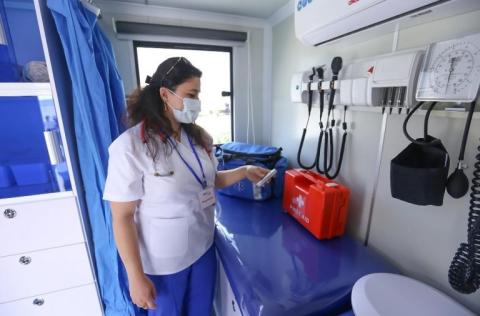
Community members and health workers in Shamakhi have seen progress, especially during the COVID-19 pandemic and the roll out of vaccines. Azerbaijan had its first case of COVID-19 in February 2020, and as of 19 August 2021 has had 377,000 cases and 5,208 deaths. The country received its first delivery of vaccines in April 2021, as part of COVAX, a global collaboration to accelerate the development, production, and equitable access to COVID-19 vaccines, and continues to vaccinate its population.
“It is good that Shamakhi has been selected as pilot area. It will be good for this region. I saw that the mobile clinics are visiting villages and assessing people’s health. People are ignorant about health, and previously, they were not provided with enough information about COVID-19. Everyone needs to be informed on health issues, and health workers can provide the right information,” said Seferov Semed.
“Many thanks to the PROACT-Care project team. They have made visits to all the villages, organized trainings for nurses and doctors and improved our knowledge […] We were trained on innovations in our own professional discipline relating to primary care. We are now more knowledgeable about the discipline of family medicine,” said Qeniyeva Vüsale, Doctor of internal medicine in Shamakhi Family Health Center.
Azerbaijan is among the 115 countries and areas to which the UHC Partnership helps deliver WHO support and technical expertise in advancing universal health coverage (UHC) with a primary health care (PHC) approach. The Partnership is one of WHO’s largest initiatives on international cooperation for UHC and PHC. It is funded by the European Union, the Grand Duchy of Luxembourg, Irish Aid, the French Ministry for Europe and Foreign Affairs, the Government of Japan – Ministry of Health, Labour and Welfare, the United Kingdom – Foreign, Commonwealth & Development Office, Belgium, Canada and Germany.
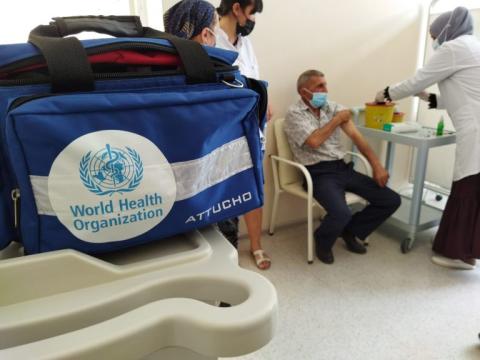
Context of health in Azerbaijan
The health system in Azerbaijan is based on the ‘Semashko’ model where polyclinics provide both primary care and outpatient specialized services. Other primary health care facilities are village medical clinics and village/town doctor clinics. Currently, the main challenges for the health system, which limit the scope and quality of primary health care services, are poor infrastructure, absence of medical equipment, shortage of health workers and lack of training. The shortage of physicians in rural areas has worsened through a combination of low salaries and existing physicians retiring and not being replaced. Only 8% of all primary health care facilities have a central water supply. As a result, primary health care facilities and services in rural areas are either not operating or rarely used by the community.
Azerbaijan has focused efforts on improving the quality and accessibility of primary health care services, to ensure that everyone in the country can receive the health care they need, in a timely manner and without causing them financial hardship. This is part of the country’s commitment to achieve UHC. Primary health care is regarded as one of the most effective and cost effective ways to achieve UHC, which is a keystone of health security. A primary health care approach, in tandem with essential public health functions, helps strengthen capacities to prepare for and respond to health emergencies. It plays a key role in preventing and managing outbreaks through immunization and community engagement. During emergencies, it ensures that essential health and social care services remain accessible and helps prevent hospitals from becoming overwhelmed.
In recent years, the Government has further demonstrated its commitment to improving the overall quality and effectiveness of its health care system by advancing health emergency preparedness and capacity building through implementation of the International Health Regulations (IHR 2005). In 2018, 2019 and 2020 Azerbaijan has submitted a review of its preparedness capacities through the State Party Self-Assessment Annual Reporting Tool, which consists of 24 indicators needed to detect, assess, notify, report and respond to public health risks of domestic and international concern. The Government also completed a Simulation Exercise in 2018 and in 2019 to assess and test the functional capabilities of its emergency systems, capacity procedures and mechanisms.
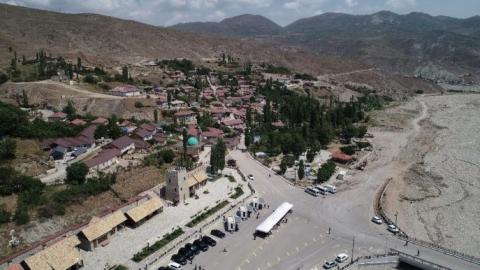
Strengthening primary health care
As part of the PROACT-Care Project, the WHO country office in Azerbaijan formed a coordination group, creating a network that included all health care authorities, financial and educational institutions related to primary health care in the country and local government representatives in the implementation district. The project team conducted a stakeholder analysis and the representative of the Management Union of Medical Territorial Units took part in the mission team, as the primary stakeholder for the provision of health care services. The local government helped to foster community participation.
WHO supported a community and health worker engagement process, including focus group discussions and a survey which took place over 2 months to identify people’s health care needs. This led to several actions to support health workers to provide better primary health care services including: nurturing motivated and knowledgeable primary health care workers from Shamakhi as local trainers and monitoring officials; establishing continuous improvement through monitoring; mentoring primary health care workers in translating their learning into authentic practice, and developing clinical guidelines for primary health care workers beginning with priority services.
“We are especially visiting the remote villages, assessing the most prominent health problems of the community, children’s and adults’ health status and accessibility to health services. We have also been working on increasing access to and comprehensiveness of preventive, diagnostic and therapeutic services both by training primary care workers, and by establishing a new primary care system,” said Aygun Mustafayeva, internal medicine specialist working with the Charhan Family Health Center Mobile Clinic.
Based on a rapid health needs assessment and learning needs assessment of primary health care workers in Shamakhi, WHO planned and developed a series of tailored training programmes. To do this, WHO organized a ‘community of learners’ with local trainers from the Public Health and Reforms Center of the Azerbaijan Republic Ministry of Health, the Administration of the Regional Medical Divisions, Azerbaijan State Advanced Training Institute for Doctors, Azerbaijan Medical University and Baku Number 2 Medical College. Two training programmes were implemented in early 2021; these were ‘Cardiometabolic risks and hypertension management in primary care’ and ‘Parental counselling on vaccines in primary care’. A total of 61 primary health care workers attended the training sessions. Some even made the journey to the training centre on tractors in heavy snow conditions.
“Perfectly functioning primary health care services have the potential to prevent diseases, improve patient care and save lives while making health care accessible for all. Even in the most remote villages of our country, people should have access to primary health care, and economic growth as well as health care transformation will allow us to achieve our goals. This project is important for the creation of a sustainable primary health care model in Azerbaijan using existing health and human resources more efficiently,” said Firengiz Aliyeva, Head of Medical Services Department, Administration of Regional Medical Divisions.
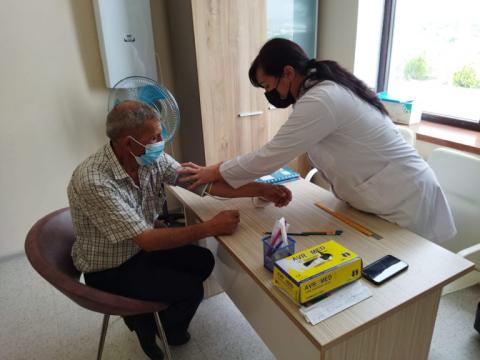
Impact
“We have a wonderful chance to strengthen primary health care in Azerbaijan to address the needs of most people. We hope that very soon, we will be able to demonstrate a useful, practical and cost-effective model for this country in collaboration with our national counterparts,” said Dr. Hande Harmancı, WHO Representative in Azerbaijan.
The project in Shamakhi has improved the capacity of 60 primary health care workers, serving rural communities with a population of 106,000 people. The results and lessons learned from the pilot project will serve as a basis for the nationwide rollout of this primary health care approach and will have a strong impact on building the primary health care foundation of the country. For Azerbaijan, this is a solid strategy to achieve UHC and boost health security, to ensure that the country will be better prepared to protect its population from future health emergencies while enabling everyone to attain good health and well-being.
